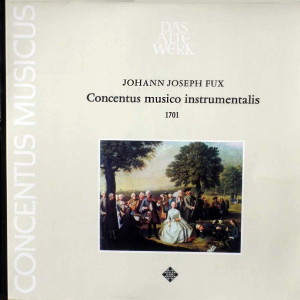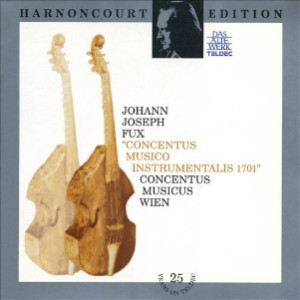 |
1 LP -
SAWT 9619-A - (p) 1970
|
 |
| 1 CD -
8.41271 XH - (c) 1989 |
|
| Johann Joseph
Fux (1660-1741) |
|
|
|
|
|
|
|
| Concentus musico
instrumentalis... 1701 |
|
|
|
|
|
|
|
| Serenata
à 8 - für 3
Clarinen, 2 Oboen, Fagott, 2 Violinen,
Viola und B.c. |
|
34' 40" |
|
- Marche,
Allegro
|
2' 11" |
|
A1 |
- Guigue,
Prestissimo
|
1' 26" |
|
A2 |
| - Menuet |
2' 16" |
|
A3 |
- Aria, più
Allegro
|
3' 26" |
|
A4 |
| - Ouverture |
3' 43" |
|
A5 |
- Menuet I,
Trio, II
|
3' 19" |
|
A6 |
- Guigue,
Prestissimo
|
1' 09" |
|
A7 |
- Aria,
Andante
|
3' 23" |
|
A8 |
| - Aria |
0' 50" |
|
A9 |
- Bourée I,
II
|
2' 11" |
|
A10 |
| - Intrada |
3' 21" |
|
B1 |
| - Rigadon |
0' 51" |
|
B2 |
| - Ciacona |
2' 58" |
|
B3 |
- Guigue,
Prestissimo
|
0' 57" |
|
B4 |
| - Menuet |
2' 11" |
|
B5 |
- Final,
poco allegro
|
0' 37" |
|
B6 |
| Rondeau à 7 - für
Violino piccolo, Fagott, Violine, 3
Violen und B.c. (Violino piccolo e
Fagotto conc.: e 4 Violins cn il Basso
continuo) |
|
4' 16" |
B7 |
| Sonata à Quattro
- für Violine, Zink,
Posaune, Dulcian und Orgel (Violino,
Cornetto, Trombone, Fagotto, Organo) |
|
8' 40" |
|
- Allegro
|
3' 36" |
|
B8 |
| - Adagio |
2' 02" |
|
B9 |
| - Allegro |
3' 03" |
|
B10 |
|
|
|
|
Don Smithers, Zink
|
|
|
|
CONCENTUS MUSICUS WIEN (mit
Originalinstrumenten)
|
|
| -
Josef Spindler, Clarintrompete |
-
Peter Schoberwalter, Barockvioline |
|
| -
Hermann Schober, Clarintrompete |
-
Wilhelm Mergl, Barockvioline |
|
| -
Günther Spindler, Clarintrompete |
-
Walter Pfeiffer, Barockvioline |
|
| -
Jürg Schaeftlein, Oboe |
-
Josef de Sordi, Barockvioline |
|
| -
Karl Gruber, Oboe |
-
Kurt Theiner, Barockvioline |
|
| -
Otto Fleischmann, Barockfagott |
-
Nikolaus Harnoncourt, Tenorviola |
|
| -
Milan Turkovic, Barockfagott |
-
Hermann Höbarth, Barockcello |
|
| -
Hans Pöttler, Barockposaune |
-
Eduard Hruza, Violone |
|
| -
Alice Harnoncourt, Barockvioline |
-
Herbert Tachezi, Cembalo, Orgel |
|
|
|
| Nikolaus
Harnoncourt, Leitung |
|
|
Luogo
e data di registrazione
|
| Casino Zögernitz,
Vienna (Austria) -
1970 |
|
Registrazione
live / studio
|
| studio |
Producer
/ Engineer
|
-
|
Prima Edizione CD
|
| Teldec
"Das Alte Werk" - Harnoncourt Edition 25
Jahrs on Teldec - 8.41271 XH - (1 cd) -
48' 12" - (c) 1989 - ADD |
Prima
Edizione LP
|
Telefunken "Das
Alte Werk" - SAWT 9619-A - (1 lp) - 48'
12"
- (p) 1970
|
|
|
Notes
|
The
veil of mystery surrounding
the life history and musical
education of Johann Joseph
Fux has still not been
lifted. When he was
approximately thirty years
old, he suddenly appeared as
a finished musician in
Vienna where he worked
mainly as an organist. The
emperor heard him at the
home of a nobleman and named
him Court Composer (the
title was created especially
for him) in 1698. Later he
entered the court orchestra
and was named conductor of
the imperial court
orchestra. - As a composer,
Fux has not been held in the
esteem he merits. That is
probably because he was the
author of the famous manual
on counterpoint Gradus ad
Parnassum (the work from
which the \/iennese
classicists still drew their
technical knowledge), and
because no one was willing
to believe that a
theoretician could also be a
full-blooded musician. Even
today, a musician who can
express himself on the
subject of music is usually
stamped a dry theoretician.
The popular picture of the
"artist" shows him
surrounded by a magic
aureole; intellect does not
fit into that picture. Fux
personally took another view
of himself: "...at the time
in which l was not yet in
full use of my reason, I was
swept away by the vehemence
of some urge that could not
identify; it directed all of
my thoughts and feelings
toward music, and even now I
am permeated by an almost
miraculous desire to learn
to master it, indeed, I am
pushed in that direction as
if I had no will of my own;
day and night my ears seem
surrounded by sweet rnusical
tones, so that I have no
reason to doubt the virtue
of my choice of profession."
In
his "Concentus musico
instrumentalis... 1701",
that he dedicated to
Leopold's son Joseph I, he
presented a collection of
sonatas and suites with
highly varying
instrumentations. ln these
works the French and Italian
styles pervade each other
and are blended with
influences that stem from
Austrian folklore. These
works must probably also be
considered to be typical of
Austria's contribution to
the baroque concert of
notions.
The Serenade on this record
is the opening piece of this
collection; it is a suite
with sixteen movements. The
versatile employment of the
valveless trumpet is
particularly interesting: in
three movements it comes
forth festively resounding,
in the other movements its
line is delicate and
cantabile. The composer
apparently wanted to
demonstrate all of the
instruments possibilities.
But even aside from the
trumpet the scoring is
remarltable. There are solo
passages for the oboes like
those that loter appeared in
Handel's Concerti grossi.
The individual movements are
in part free fantasy forms
(Marche, Aria, Aria,
lntrada, Finale), in part
dances or the movements of
the French overture suite
(Guigue, Menuet Ouverture,
Menuet l, ll, Guigue, Aria
[Passepied] Bourrée I, ll, Rigadon,
Ciacona, Guigue, Menuet).
But Fux by no means kept
strictly to a formal pattern
in the movements. To the
Guigue, Ciacona and Menuet
he wrote a free solo part
for the trumpet: elements of
peasant music from his
native Styria can be heard
repeatedly, for example, in
several minuets, but
especially in the completely
unorthodox Ciacona that at
times sounds just like a
Ländler.
The other two pieces on this
recording were found in the
Dresden State Library; The
Rondeau a 7 was included in
this collection chiefly for
its unusual solo group. A
simple dance-like theme
(that is played by all
instruments eleven times
with slight rhythmic and
dynamic variation) forms a
framework for the soli and
duets of the violino piccolo
and the bassaon. The Sonata
a Quattro requires exactly
the same instruments as
Schmelzer's Carioletta, a
generation later, however;
hence it is considerably
clearer and smoother, a
masterpiece of four-port
chamber musrc, scored for
four entirely different
sounding instruments; thus
the individual voices always
remain independently clear
and maintain their presence
throughout the contrapuntal
structure.
That Vienna was already a
center of music in the
baroque period is probably
chiefly due to the
extraordinary enthusiasm
shown by several Hapsburg
emperors for music. In the
case of Leopold I
(1640-1705), Austria's
baroque emperor par
excellence enthousiasm grew
steadily into fanaticism.
Yhis strange man, who was
emperor for nearly fifty
years, was by no means a
born ruler. Since he was
sickly and weak, had a
strong brother (Ferinand IV)
and was furthermore highly
plous, he was educated for
the priesthood. The sudden
death of his brother thus
forced him into a role for
which he was completely
unprepared. Nonetheless, or
perhaps for just that very
reason and despite all of
its dissonant tones, the
period of his reign was
thoroughly fruitful and in
no wise less successful than
that of his brilliant French
counterpart, Louis XIV,
whose reign was just about
as long. Leopold was not at
all war-like. A lovely
concert meant more to him
than winning a battle. His
generals complained that,
although he had no money for
the army, he still gave out
huge sums for his opera
performances. - Leopold not
only had a passionate ear
for music, he himself was
also a composer, and not a
bad one. He wrote masses,
oratorios, dances, German
songs and many additions to
the compositions of his
court musicians. Frequently
he was satisfied in
inventing the melody and
left the instrumentation to
his court composers Berthali
or Ebner. Although the
Austrian state coffers were
always empty, often even in
debt, the Italian musicians
in the court orchestra
received princely salaries.
In every respect they were
the predecessors of today's
highly paid "star"
musicians. - Gottlieb
Eucharius Rinck, a captain
in the imperial army, wrote
about Leopold and his court
orchestra: "The emperor is a
great artist in music... if
there was anything in this
world that gave the emperor
pleasure, it was
unmistakably good music. It
increased his joy, it
diminished his worries, and
one can say of him that he
never had any more
pleasurable hour among any
form of diversion than that
which a well-fitted concert
gave him. This could be seen
particularly in his rooms.
For when he, as was his
customs, changed residence
four times a year - namely,
from the castle to
Laxenburg, from there to the
"Favority" and then to
Ebersburg, there was always
a costly spinet in each of
the emperor's rooms, upon
which the emperor spent all
of his leisurely hours. His
band can well be called the
most perfect orchestra in
the world, and that is
surely no wonder since the
emperor himself held the
examination. Whenever an
applicant was accepted, then
he had been judged according
to his merits and not by
inclination... One can judge
from the number of
experienced musicians how
expensive they must have
been for the emperor. For
many of these people were
barons and were paid such
salaries that they could
live as befits their
station... Whenever the
emperor was in a concert of
his incomparable orchestra,
he enjoyed himself so much
that he gave unlimited
attention, such as if he
were bearing it for the very
first time... When a passage
came that particularly
pleased him, he closed his
eyes tightly so as to listen
with greater attention. His
ear was so keen that he
could detect among fifty
players which one had bowed
incorrectly."
Nikolaus
Harnoncourt
|
|
Nikolaus
Harnoncourt (1929-2016)
|

|

|
|